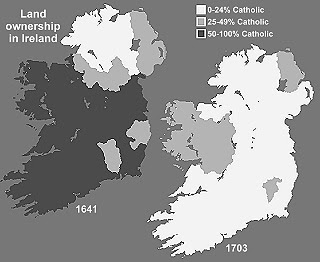The Two Faces of John Gormley
30/07/10
 Speaking at a Green Party gathering in Limerick last Saturday [July 24], party leader and Twenty-Six County environment minister John Gormley gave a pledge to end corporate donations to parties in the state, as well as criticising the pervasive influence of big business on politics.
Speaking at a Green Party gathering in Limerick last Saturday [July 24], party leader and Twenty-Six County environment minister John Gormley gave a pledge to end corporate donations to parties in the state, as well as criticising the pervasive influence of big business on politics.
A few days earlier, it was revealed that waste processing company Covanta are considering legal action over Gormley’s continued refusal to grant a foreshore license for the controversial waste incinerator plant in Poolbeg, Dublin.
While Gormley is presenting a tough façade as a fighter against corporate interests, it’s worth pointing out that, earlier this month, he had no problem granting Shell Oil permission to drill 80 boreholes in the Sruth Fada Conn estuary in Erris, north County Mayo. It’s also worth pointing out that the Poolbeg incinerator would just happen to fall within Gormley’s own constituency of Dublin South East.
In a statement in response to the developments, Dublin Shell to Sea spokesperson Caoimhe Kerins said: “In the Dublin South East constituency, where votes matter to him, Minister Gormley presents himself an ‘Environmental Super-Hero’ willing to slay corporate giants in the face of threats of legal action and multiple jobs losses.
“Minster Gormley is prepared to scrap an incinerator plan leading to a legal battle, but yet refuses to renegotiate the fiscal terms surrounding our large oil and gas resources, which would not lead to litigation, despite repeated false government assertions to the contrary, and could only in fact lead to significant revenue for the state. In the run up to yet another difficult budget, it appears he is only interested in protecting his personal votes as opposed to what would benefit the people of Ireland.”
Commenting on recent events, cathaoirleach éirígí Brian Leeson said: “The fact that Sruth Fada Conn is part of an EU Special Area of Conservation doesn’t seem to have fazed the ‘green’ minister at all.
“Since Gormley granted Shell its most recent license in Kilcommon, we have seen an increase in Garda violence against peaceful protestors who oppose Shell’s operation, telling one campaigner that they had his last breath in their hands.”
Leeson continued: “We have also seen hack journalists in the corporate media, such as Tony O’Reilly’s Sunday Independent, resume their smear campaign against people who have the gall to worry about the health and safety of the Rossport community, and who argue for a different way of going about the exploitation of our natural resources. John Gormley needs to take his blinkers off and start challenging the corporate agenda that dominates this state, instead of engaging in empty rhetoric on the issue.
“éirígí reaffirms its support for the Shell to Sea campaign in its efforts to challenge the complicity of the Twenty-Six County state in the robbery of our gas and oil. Regardless of Garda threats or media vilification, we have supported the people of Rossport in the past and will continue to do so now and into the future.”

 The body of Jon Anza, patriot and ETA activist, was finally returned to the Basque Country last week.
The body of Jon Anza, patriot and ETA activist, was finally returned to the Basque Country last week.




.jpg)

























